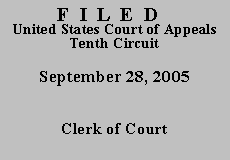 UNITED STATES COURT OF APPEALS
UNITED STATES COURT OF APPEALS
 UNITED STATES COURT OF APPEALS
UNITED STATES COURT OF APPEALS
| EDWARD JOHN
VANWOUDENBERG,
Petitioner-Appellant, v. GLYNN BOOHER, Respondent-Appellee. |
|
Vanwoudenberg was convicted in Oklahoma state court of driving while under the influence after two or more prior convictions and sentenced to twenty years' imprisonment. Having exhausted his state court remedies, Vanwoudenberg filed a § 2254 petition in the court below arguing that the trial court erred in failing to give a lesser-included offense instruction, that his trial counsel was ineffective for failing to request a lesser-included offense instruction, that his sentence was imposed in violation of state law, and that the cumulative effect of these errors deprived him of a fair trial.
Under AEDPA, if a claim is adjudicated on the merits in state court, a federal court will grant habeas relief only if that adjudication resulted in a decision "that was contrary to, or involved an unreasonable application of, clearly established Federal law, as determined by the Supreme Court of the United States" or "was based on an unreasonable determination of the facts in light of the evidence presented in the State court proceeding." 28 U.S.C. § 2254(d)(1)(2). After thoroughly reviewing Vanwoudenberg's claims in light of this demanding standard, the magistrate judge recommended that Vanwoudenberg's petition be dismissed. Over Vanwoudenberg's objection, the district court adopted the magistrate judge's proposed findings and dismissed Vanwoudenberg's petition. His request for a COA having been denied below, he now seeks a COA from this court, presenting the same arguments as he presented below.(*)
On direct appeal, the Oklahoma Court of Criminal Appeals concluded that the evidence did not support an instruction on the lesser included offense of driving while impaired. The state court's determination is not contrary to, nor did it involve an unreasonable application of, clearly established federal law. See, e.g., Lujan v. Tansy, 2 F.3d 1031, 1036 (10th Cir. 1993) ("a petitioner in a non-capital case is not entitled to habeas relief for the failure to give a lesser-included offense instruction even if in our view there was sufficient evidence to warrant the giving of an instruction on a lesser included offense."). Additionally, the state court held that Vanwoudenberg's counsel was not ineffective under the standard set forth in Strickland v. Washington, 466 U.S. 668 (1984), for declining to request a lesser-included offense instruction. On review of the record, we conclude that the state court properly applied Strickland.
Vanwoudenberg's final claim of error is that the trial court imposed his sentence in violation of state law. Because Vanwoudenberg had three prior convictions for driving while under the influence, he was charged with a felony rather than a misdemeanor, pursuant to 47 Okla. Stat. § 11-902(c). He faced a twenty year minimum sentence, under 21 Okla. Stat. § 51.1, because he had three prior non-DUI felonies as well. He argued on appeal that the enhancement provisions of Title 21 cannot apply to crimes upgraded to felonies under Title 47. After construing the relevant statutes, the state court rejected Vanwoudenberg's argument. Vanwoudenberg reasserts his state law claim on federal habeas review. "[I]t is not the province of a federal habeas court to reexamine state-court determinations on state-law questions. In conducting habeas review, a federal court is limited to deciding whether a conviction violated the Constitution, laws, or treaties of the United States." Estelle v. McGuire, 502 U.S. 62, 67-68 (1991). Vanwoudenberg's state law arguments are not cognizable in this action.(2)
Because the state court determined that none of Vanwoudenberg's arguments demonstrated error, it held that cumulative error does not plague his conviction or sentence. We agree. Vanwoudenberg's application for a COA is
DENIED and the appeal is DISMISSED.
ENTERED FOR THE COURT
Carlos F. Lucero
Circuit Judge
*. Vanwoudenberg's petition was filed after April 24, 1996, the effective date of the Antiterrorism and Effective Death Penalty Act ("AEDPA"); as a result, AEDPA's provisions apply to this case. See Rogers v. Gibson, 173 F.3d 1278, 1282 n.1 (10th Cir. 1999) (citing Lindh v. Murphy, 521 U.S. 320 (1997)). AEDPA conditions a petitioner's right to appeal a denial of habeas relief under § 2254 upon a grant of a COA. 28 U.S.C. § 2253(c)(1)(A). A COA may be issued "only if the applicant has made a substantial showing of the denial of a constitutional right." § 2253(c)(2). This requires Vanwoudenberg to show "that reasonable jurists could debate whether (or, for that matter, agree that) the petition should have been resolved in a different manner or that the issues presented were adequate to deserve encouragement to proceed further." Slack v. McDaniel, 529 U.S. 473, 484 (2000) (quotations omitted). Because the district court denied Vanwoudenberg a COA, he may not appeal the district court's decision absent a grant of COA by this court.
2. Vanwoudenberg argues in his application for a COA that his sentence violated the Ex Post Facto Clause because he was sentenced under 21 Okla. Stat. § 51, but prior to sentencing that statute was recodified at 21 Okla. Stat. § 51.1. He also asserts that his sentence was imposed in contravention of the Court's holding in Blakely v. Washington, 542 U.S. 296 (2004). Vanwoudenberg failed to raise these arguments below, and we decline to address them. See, e.g., In re Walker, 959 F.2d 894, 896 (10th Cir. 1992) ("a federal appellate court does not consider an issue not passed upon below."); Barnes v. Scott, 201 F.3d 1292, 1294 n.2 (10th Cir. 2000) (applying Walker in § 2254 case).